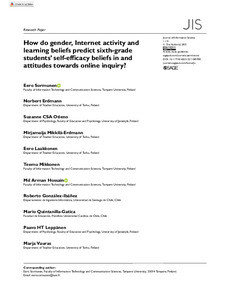How do gender, Internet activity and learning beliefs predict sixth-grade students’ self-efficacy beliefs in and attitudes towards online inquiry?
Sormunen, Eero; Erdmann, Norbert; Otieno, Suzanne; Mikkilä-Erdmann, Mirjamaija; Mikkonen, Teemu; Hossain, Md Arman; González-Ibáñez, Roberto; Quintanilla-Gatica, Mario; Leppänen, Paavo HT; Vauras, Marja (2023)
Sormunen, Eero
Erdmann, Norbert
Otieno, Suzanne
Mikkilä-Erdmann, Mirjamaija
Mikkonen, Teemu
Hossain, Md Arman
González-Ibáñez, Roberto
Quintanilla-Gatica, Mario
Leppänen, Paavo HT
Vauras, Marja
2023
Julkaisun pysyvä osoite on
https://urn.fi/URN:NBN:fi:tuni-202201051084
https://urn.fi/URN:NBN:fi:tuni-202201051084
Kuvaus
Peer reviewed
Tiivistelmä
Today’s students search, evaluate and actively use Web information in their school assignments, that is, they conduct an online inquiry. This current survey study addresses sixth-grade students’ self-efficacy beliefs in and attitudes towards online inquiry, and to what extent free-time and school-related Internet activity, gender and learning beliefs explain these. The questionnaire was administered in 10 schools to 340 sixth-graders in Finland. Exploratory and confirmatory factor analyses revealed three elements of self-efficacy beliefs: self-efficacy in Web searching, the evaluation of sources and synthesising information. Furthermore, attitudes towards online inquiry loaded into two factors: a positive and a negative attitude towards online inquiry. A structural equation model was used to analyse the effects of the explanatory variables on the factors. The results of this work suggest that gender and free-time Internet use predict most sixth-graders’ self-efficacy beliefs in and attitudes towards online inquiry.
Kokoelmat
- TUNICRIS-julkaisut [16929]
